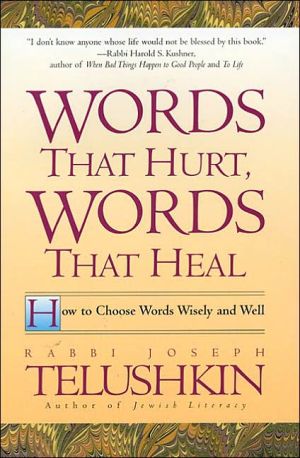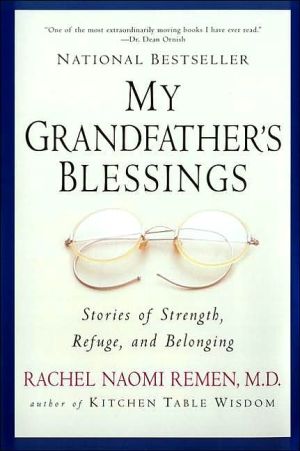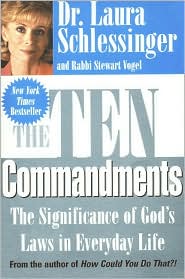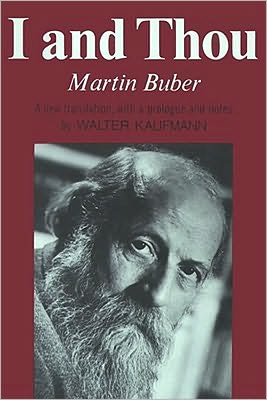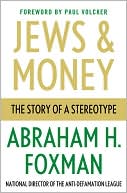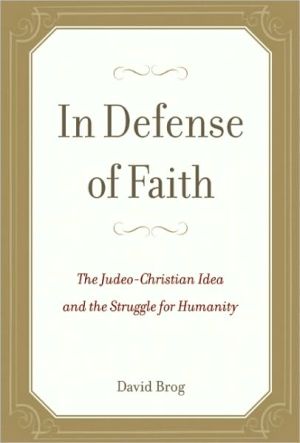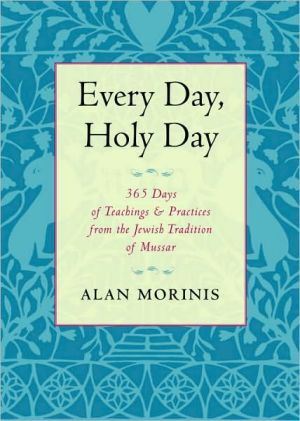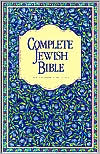Words That Hurt, Words That Heal: How to Choose Words Wisely and Well
Joseph Telushkin is renowned for his warmth, his erudition, and his richly anecdotal insights, and in Words That Hurt, Words That Heal he focuses these gifts on the words we use in public and in private, revealing their tremendous power to shape relationships. With wit and wide-ranging intelligence, Rabbi Telushkin explains the harm in spreading gossip, rumors, or others' secrets, and how unfair anger, excessive criticism, or lying undermines true communication. By sensitizing us to...
Search in google:
Joseph Telushkin is renowned for his warmth, his erudition, and his richly anecdotal insights, and in Words That Hurt, Words That Heal he focuses these gifts on the words we use in public and in private, revealing their tremendous power to shape relationships. With wit and wide-ranging intelligence, Rabbi Telushkin explains the harm in spreading gossip, rumors, or others' secrets, and how unfair anger, excessive criticism, or lying undermines true communication. By sensitizing us to subtleties of speech we may never have considered before, he shows us how to turn every exchange into an opportunity.Remarkable for its clarity and practicality, Words That Hurt, Words That Heal illuminates the powerful effects we create by what we say and how we say it. Publishers Weekly Contrary to the nursery rhyme, words can hurt as much as sticks and stones. In this wise book, Rabbi Telushkin (Jewish Wisdom) draws on Jewish teachings, primarily the Talmud, and traditional Jewish stories to explore how our words can harm others and how we can approach the act of speaking in a more ethical, even sacred, manner. Acting on the principle that self-awareness is the initial step toward transformation, Telushkin first brings gossip, lying and angry words into the light, and then prescribes possible remedies for these so often unconscious habits of expression. Wit informs his text, as does a courageous intelligence-for instance, in his defending, against recent conventional and media wisdom, the right of public figures "to keep their private lives private." Telushkin concludes with a proposal for a national "Speak No Evil Day," which, if acted upon, he says, can offer "a taste of heaven on earth." Author tour. (Apr.)
IntroductionPt. 1The Unrecognized Power of Words11The Unrecognized Power of Words3Pt. 2How We Speak About Others112The Irrevocable Damage Inflicted by Gossip153The Lure of Gossip354When, If Ever, Is It Appropriate to Reveal Information That Will Humiliate or Harm Another?465Privacy and Public Figures55Pt. 3How We Speak to Others676Controlling Rage and Anger697Fighting Fair848How to Criticize, and How to Accept Rebuke909Between Parents and Children10710The Cost of Public Humiliation11811Is Lying Always Wrong?133Pt. 4Words That Heal14712Words That Heal151Pt. 5What Do We Do Now?16713Incorporating the Principles of Ethical Speech into Daily Life16914Where Heaven and Earth Touch: A National "Speak No Evil Day"183Appendix: Text of Senate Resolution to Establish a National "Speak No Evil Day"187Notes189Index209
\ Publishers Weekly - Publisher's Weekly\ Contrary to the nursery rhyme, words can hurt as much as sticks and stones. In this wise book, Rabbi Telushkin (Jewish Wisdom) draws on Jewish teachings, primarily the Talmud, and traditional Jewish stories to explore how our words can harm others and how we can approach the act of speaking in a more ethical, even sacred, manner. Acting on the principle that self-awareness is the initial step toward transformation, Telushkin first brings gossip, lying and angry words into the light, and then prescribes possible remedies for these so often unconscious habits of expression. Wit informs his text, as does a courageous intelligence-for instance, in his defending, against recent conventional and media wisdom, the right of public figures "to keep their private lives private." Telushkin concludes with a proposal for a national "Speak No Evil Day," which, if acted upon, he says, can offer "a taste of heaven on earth." Author tour. (Apr.)\ \ \ \ \ Library JournalFor religious communities, the power of human language to inspire, educate, and unite individuals has a long, valued tradition. Rabbi Telushkin (Jewish Wisdom, LJ 9/1/94) suggests that we need look no further than the Book of Genesis in order to comprehend the true power of our spoken language. Conversely, and more to Telushkin's purpose here, the ways in which we use language in our everyday lives is often harmful and destructive. He argues that if a person cannot go for more than 24 hours without saying any unkind words about or to anyone, then that person has lost control of his tongue. In the first half of the book, Telushkin uses biblical passages, religious parables, and personal anecdotes to illustrate how language is too commonly used for negative purposes-gossip, unfair criticism, and lying, for example. The remaining chapters cover the ways in which language can be used to create positive, healthy relationships and environments. To his credit, the author's use of religious stories and examples is executed in an even-handed, nonpreachy manner, and the moral framework by which he constructs his arguments appeals to a common sense of humanity and decency. Although all of his points have been made before, it is worth hearing them again. For public libraries.-David R. Johnson, Fayetteville P.L., Ark.\ \ \ Kirkus ReviewsAn ethical self-help book for all of us who belittle lies, slander, and gossip as "only words."\ According to Telushkin, a rabbi and popularizer of Jewish lore (Jewish Wisdom, 1994, etc.), it is easier to give up alcohol than to abandon our daily diet of verbal cruelties. The author demonstrates how "negative truths" or outright slander can be a prelude to murder, whether issued by a government propaganda office or a gangsta rapper. Even a lie in service of a good cause is reprehensible: Feminist misinformation about 150,000 annual deaths from anorexia exemplifies what Telushkin calls the "macro" lie. The American press, in particular, is called to task for needlessly ruining lives. Telushkin presents the case of Oliver Sipple, who saved President Ford's life in 1975. The author maintains that Sipple was cut off from his family and drank himself to death after the papers exposed him as a homosexual. When catching a child in a lie, we are advised to mention the mistruth but not to brand the child a liar. Telushkin offers several harrowing examples of people scarred for life by childhood verbal assaults. White lies for moral reasons are praised, while St. Augustine's absolute value put on the truth is said to be a dangerous extreme. "Words that heal" don't get as much treatment here, but freer expression of compliments, regrets, and love is extolled. The book concludes with the verbal equivalent of the "Great American Smoke Out"—a proposed "Speak No Evil Day." A cynic might anticipate "See No Evil" and "Hear No Evil" days as well and dismiss much of this book as clichéd, moralistic pap. But the rabbi's erudite, insightful, yet punchy sermon will have most readers nodding in embarrassed self-recognition.\ Telushkin delivers a necessary tongue-lashing for a culture that needs to lash its tongue.\ \ \
